PROPHETS AND POLITICS IN ANCIENT AMERICA
Similarities between Israelite and Nephite governmental institutions and policies offer additional evidence for the authenticity of the Book of Mormon
Suppose that as a young adult you decided to invent a religious history of an ancient Middle Eastern civilization and try to sell it as authentic. But you have had only three years of formal education. In over five hundred pages you will necessarily make numerous references to forms of government and to civil policies and procedures. What are the chances you could do so without including elements that historians could later argue were out of place? For example, if you mentioned presidents, a congress, a supreme court, a cabinet, or elections as we know them, it would be clear that your story was a fabrication, as no such institutions existed in the ancient Middle East.
But did Joseph Smith know that in 1830, when he published the Book of Mormon? Those who claim he simply made up the story of the Nephite civilization must explain how the young prophet, with the equivalent of only three years of school, managed to describe the governmental institutions and policies of the Nephites exactly as they would be expected to have been among a group of transplanted Israelites.
The Book of Mormon presents the Nephites as proud of their Israelite heritage and committed to the law of Moses in its civil as well as religious ramifications. It would be expected that Nephite governmental institutions and policies should parallel those established by divine sanction in the Old World. That such proves to be the case, while both differ in important respects from other ancient and modern political systems, constitutes additional circumstantial evidence for the authenticity of the Nephite record itself.
It could be argued that Joseph Smith could have simply read the Bible and made his fictional Nephite governments correspond with those of the Old Testament. But few readers of the Old Testament and Book of Mormon today have noticed just how perfectly Nephite institutions paralleled those of ancient Israel. It seems highly unlikely that Joseph Smith himself noticed many of the correspondences. Ask yourself, how many of the following parallels you had personally noticed before they were pointed out. (Scriptural references are illustrative rather than exhaustive.)
1) Both governments in their earliest stages were patriarchal, though in both cases there were notable exceptions to the law of primogeniture, with a younger son being chosen over his less worthy or less capable older brother to inherit the position of tribal leadership. (Gen. 25:24; 49:3-4, 26; 48:14; 1 Ne. 2:22.)

2) In both nations, religious and political authority was customarily centered in the same individual–e.g., Melchizedek, Moses, Samuel, Nephi, Mosiah, Benjamin, Alma. In both societies God revealed the legal code, appointed the rulers, and gave frequent revelation concerning governmental policy. (Gen. 14:18; Ex. 3:10ff; 1 Chron. 17:10; Judges 8:23; 1 Sam. 8:7; 9:17; 15:23; 2 Sam. 2:1; 2 Kings 9:3; 11:12; 2 Ne. 6:2; Mosiah 1-4; 29:25, 42.)
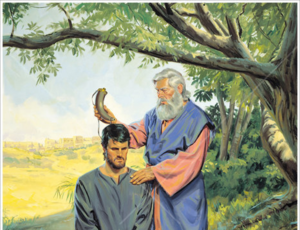
3) Both had a monarchial period and a period in which they were governed by so-called “judges.” (1 Sam. 8; Mosiah 29.)
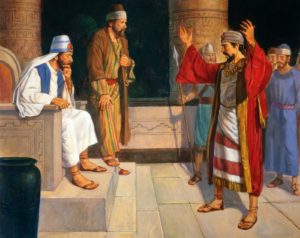
4) In both cultures monarchy was considered the ideal state, though pragmatic considerations sometimes made another system advisable. In the Book of Mormon, under prophetic direction, the Nephites began with a monarchy. They abandoned it due to a change of circumstances, while recognizing that if good kings such as King Benjamin could always be assured, it would have been best to always have kings. In the Old Testament, we find Samuel warning against the potential pitfalls of a monarchy. But the great high priest Melchizedek, to whom even Abraham paid tithes, ruled as king in Salem, not as a chief judge or governor. And the Bible makes clear that the Messiah Himself will rule one day as “King of Kings.” (Mos. 29:13; Alma 13:17-19.)
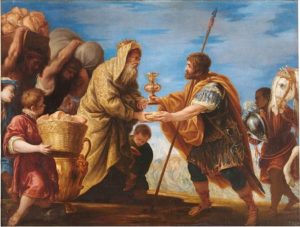
5) “Judges” in both cases served not only in a judicial capacity but as military and executive officers as well. (Judges 2:16; Alma 2:16.)
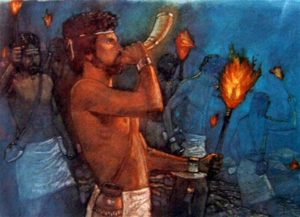
6) Under the reign of the judges, the government was decentralized, with several levels of officers discernible. Local judges functioned quite independently of the chief judge, although the system provided for an appeal from the decision of the lower echelon officials. (Deut. 31:28; Judges 20; 1 Sam. 30:26; Mosiah 29:28-29; Alma 14.)
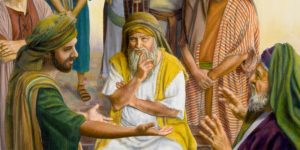
7) New legislation was unusual in both nations, as the established law was accepted as divinely given. (Joshua 1:7; Mosiah 29:25, 39; Alma 1:1; 51:3; Hel. 4:22.)
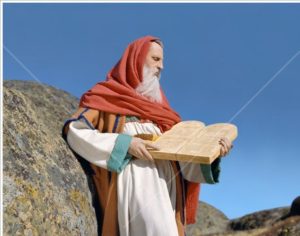
8) Government in both nations and under both organizational systems was much more limited than that of most other nations past or present, and citizens enjoyed personal liberties to a correspondingly greater degree. Even kings were viewed primarily as protectors and teachers rather than rulers. (Alma 61:15; Judges 8:23; Deut. 17:15-19; 2 Ne. 6:2; Lev. 25:10.)
9) The principle of popular consent characterized both nations throughout their history. Not only did the people approve or disapprove proposed governmental officials, but they had a voice in the determination of public policy. However, this was quite unlike modern practices of campaigning and voting. (1 Sam. 12:1-5; 2 Sam. 5:3; 2 Kings 11:12; 2 Kings 23:1-3; Deut. 16:18; Judges 20:7; 1 Kings 12:1-20; Mos. 2:11; Hel. 5:2.)
10) In neither nation did the civil law provide for taxation of one segment of society to provide for the poor, though in both the prophets urged voluntary charity. (Lev. 19:9-10; 25:8-55; 27:16-25; Deut. 24:19-21; Alma 5:55-56; Hel. 6:38.)
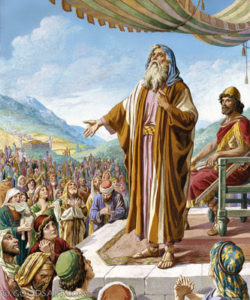
11) Ordinary citizens were involved in the apprehension of lawbreakers, the rendering of at least some judicial decisions, and the execution of prescribed penalties. (Deut. 17:4-7; 19:16-18; Alma 30:20; Hel. 1:8.)
12) Punishments for crime emphasized restitution to the offended party and rehabilitation of the offender. Penalties for non-capital crimes were surprisingly lenient. Prisons were seldom used, though they have been standard practice in most other nations. Exile seems to have been a common form of punishment. (Ex. 22:1-4; 30:33-38; Numbers 5:7-8; Alma 11:2; Hel. 1:33.)
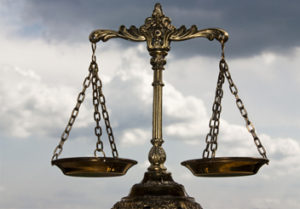
13) Serious offenses, including but not limited to murder, were punishable by death. In both cultures the practice was justified in part by a sense of divine obligation. (Ex. 21:12; Lev. 20:10; Alma 1:13; 30:10; 42:19; 62:9.)
14) Military action in each nation was considered justifiable only if the Lord commanded, if the nation were attacked, or if an enemy nation rejected repeated peace overtures. Even in warfare it was forbidden to take unfair advantage of an enemy force. (Deut. 20:10-20; Alma 48:11-17; 55:19-25; 3 Ne. 3:20-21.)
15) Nephite and Israelite leaders customarily led, rather than sent, their troops into battle. (1 Samuel 17-18; Alma 2:16.)
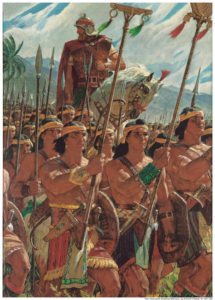
16) Volunteer and ad hoc armies were the rule and the ideal in both nations. (Judges 6:35; Alma 46:19-21.)
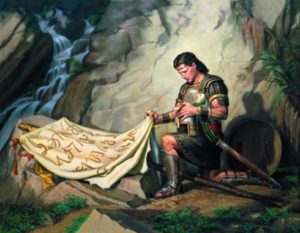
17) International diplomacy was characterized by an unwillingness to compromise principle and a reluctance to enter into formal treaties at all, despite a willingness to engage in trade and otherwise have peaceful intercourse with non-belligerent nations. (Is. 31:1; Hel. 6:8; 3 Ne. 3:12; Mormon 2:28-29; 3:1; 3 Ne. 3:7-8.)
18) Prophets in both lands taught that national righteousness, rather than governmental structure or military strength, was the real key to peace, liberty, and prosperity. (Prov. 14:34; 2 Ne. 1:7, 20; Ether 2:12.)
Singly these parallels may seem unimpressive. But together, when examined in depth, they form a pattern unique to the ancient Israelites and the Nephites among political entities known to history. It is impossible to prove to a determined skeptic that Joseph Smith didn’t simply carefully copy the Old Testament description of Israelite governmental practices. Yet for an uneducated young man, with no training in political science and little knowledge of history, to have written a religious novel dealing only incidentally with politics but nonetheless incorporating the basic political structures and policies of the ancient Israelites into his description of the New World government of a transplanted Jewish colony, even in subtle details, must strike the unbiased observer as at least as unlikely as Joseph’s claimed visitation of angels.
Those interested in examining the subject in more detail can find my master’s thesis on the subject at https://scholarsarchive.byu.edu/etd/4587/.
